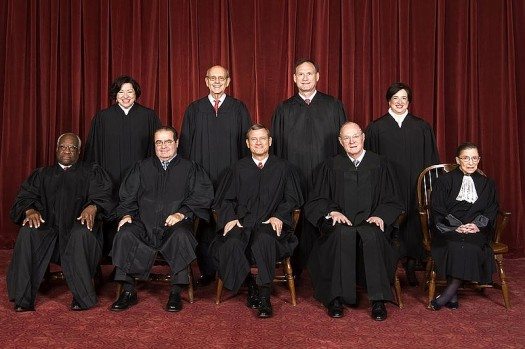Labor & Economy
Supreme Court Decision: Mulhall, Interrupted

A few weeks ago we told you about a U.S. Supreme Court case and noted that a decision wasn’t expected until Spring. However, by a margin of either 5-4 or 6-3, SCOTUS moved fast with this one, with the brave decision earlier this week… to duck.
The case, UNITE HERE Local 335 v. Mulhall, was an attempt to overturn a bizarre ruling by the 11th Circuit Court that threatened card check neutrality agreements, the manner in which most unions have organized for the past two decades.
UNITE HERE sought to organize a proposed casino in Florida, and said casino, to be built and run by Mardi Gras Gaming, needed the approval of voters. To that end, Mardi Gras and UNITE HERE made an agreement. UNITE HERE would agree not to strike or boycott the property, and to support the casino’s construction. Mardi Gras would agree to be neutral in any organizing effort and to recognize the union if a majority of workers signed authorization cards saying they wished to be represented by Local 335.
That was all fine until the National Right to Work Legal Defense Foundation got involved, and came up with a rather novel theory. You see, the agreement also included a commitment by Mardi Gras to give Local 335 the names of its workers so that the union might contact them, and to not call security when Local 335 organizers came onto casino property to speak to workers during their breaks.
These last bits, our Orwellian friends argued, violated a law preventing unions and their staff from accepting gifts from employers. This National Labor Relations Board rule is designed to stop a union from getting money to accept a cheap contract. “Thing of value” is the term of art, and the NRWLDF argued that Mardi Gras’ promise of names and the right to come onto its property were things of value, leading to wonderfully amusing banter in the Court hearing about whether a company can in fact freely control its own property, and the right-wingers suggesting that they might be legally obligated to sell such access.
The suit was filed and duly defeated, but the 11th Circuit in its wisdom later ruled in NRWLDF’s favor, leading to UNITE HERE’s appeal. The Supreme Court took the case, and much of labor held its breath, fearing the worst. The hearing went well enough, however, and to my amateur eyes, I counted five good souls skeptical of the Mulhall side.
So it was somewhat shocking to find this per curium earlier this week in which the case was dismissed as “improvidently granted.” Since it takes four votes to accept a case, it’s pretty rare to throw the case out a few months later. In this instance, the Court decided that since UNITE HERE never organized the place using the neutrality agreement, the issue was moot and the original plaintiff had no standing. Which sounds fine, except it leaves in place the 11th Circuit decision, a ludicrous result.
The SCOTUS blog and In These Times both seem to think this was a rather lucky break for labor, since Roberts et al didn’t get to destroy card check neutrality, with In These Times going so far as to criticize UNITE HERE for even bringing the case in the first place.
To me, that’s a pretty substantial misread of the situation. One never knows for sure what the Court might have done, but evidence suggests UNITE HERE was (forgive me) a betting favorite. The Mulhall argument is silly, and was generally seen as such in chambers. The plaintiff’s attorney was tripped up repeatedly in his remarks, while Justice Kennedy, always the swing vote, seemed to lean toward the good guys.
More basic is who voted to dismiss. Three members of the Court opposed dismissing the case, and all backed the UNITE HERE side. When the case is thrown out by one side, and the other wants to keep it in, who do you think was favored to win? Then there’s the rather cheery spin from NRWLDF, which seems pretty relieved.
In case you’re wondering, card checks are still legal, though it’s a bit up in the air in Georgia. The NRWLDF’s wings have been clipped, but I’ve no doubt they’ll take another run at things soon. Since we win a good number of card checks round these parts, keep an eye out for your friendly neighborhood union buster.
One final note. The 11th Circuit is not exactly known for its record. See, for example, this. Or this. You might then recall this. All of which goes to explain why this might be a somewhat important issue.
-

 The Heat 2024April 1, 2024
The Heat 2024April 1, 2024The Way-Down-the-Ballot Races That Could Transform Energy Policy for Millions
-

 California UncoveredMarch 18, 2024
California UncoveredMarch 18, 2024A California Program to Get Produce to Low-Income Families Is a Hit. Now It Is Running Out of Money.
-

 Extreme WealthApril 2, 2024
Extreme WealthApril 2, 2024Extreme Wealth Is on the Ballot This Year — Will Americans Vote to Tax the Rich?
-

 The Heat 2024March 19, 2024
The Heat 2024March 19, 2024In Deep Red Utah, Climate Concerns Are Now Motivating Candidates
-

 Latest NewsApril 3, 2024
Latest NewsApril 3, 2024Tried as an Adult at 16: California’s Laws Have Changed but Angelo Vasquez’s Sentence Has Not
-

 Latest NewsMarch 20, 2024
Latest NewsMarch 20, 2024‘Every Day the Ocean Is Eating Away at the Land’
-

 State of InequalityApril 4, 2024
State of InequalityApril 4, 2024No, the New Minimum Wage Won’t Wreck the Fast Food Industry or the Economy
-

 State of InequalityMarch 21, 2024
State of InequalityMarch 21, 2024Nurses Union Says State Watchdog Does Not Adequately Investigate Staffing Crisis



















